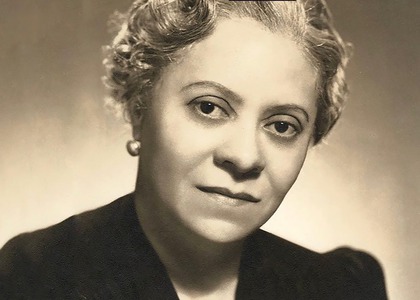Disk of 2022

Philadelphia Symphonic Orchestra, conductor Yannick Nezet Seguin – Music box, January 24th 2022
A CD awarded at Grammy awards: two symphonies by Florence Price, recorded by Philadelphia Symphonic Orchestra, conducted by Yannick Nezet Seguin. The album launched on January 14th 2022 under the Deutsche Grammophon music label. The exclusive digital version appeared on the market on September 24th 2021
Florence Price is an Afro-American composer who lived between 1887 and 1953. In fact, she is the first Afro-American whose works were sang by an important orchestra in America. She wrote over 300 works, including 4 symphonies and 4 concerts; on the CD appear Symphonies I and III, composed during the 4th decade of the 20th century.
In 1932, Florence Price entered her first symphony composed since 1931, in the Rodman Wanamaker Competition, and she won the first prize worth 500 dollars. Moreover, Price reached national appreciation, and the back then director of the Chicago Symphonic Orchestra, Frederick Stock, remembered the work which he performed during the premier in Chicago in 1933.
As the years passed by, and after the premier's success, Florence Price's first symphony gradually fell into oblivion, almost until present. In 2019, Fort Smith Symphony Orchestra recorded for the first time in the Modern Age with Naxos Records, and now we have this mesmerizing recording of the Philadelphia Symphonic Orchestra, conducted by Yannick Nezet Seguin, performed in May 2021.
I don't think that art functions according to skin color or gender - more exactly, the positive discrimination on these criteria. In art, especially in music, we have the measure of artistic value, the only one that can offer a realistic perspective. Between 2019 and 2021 appeared no more than 24 CDs with Florence Price's music - and in the previous years at least one. Of course, it is the effect of a politic which brings into light some discriminated categories of the American culture in the past - the blacks and women, and Florence Price was the perfect example of this category. However, I would like to add that her music really deserves to be sang: an idiom of romantic and melodic nature which also includes the black-spirituals melodies, interestingly presented orchestrations - professionalism, in a single word, which transcends both the skin color and the gender of the author.
In Symphony III composed between 1938 and 1940, Florence Price explores the black-spirituals melodic, but not at the same intensity as in Symphony I. Once again, we meet a dance move named Juba Dance in the third part, as well as sounds that are no longer reminiscent of Dvorak as in the Symphony I, but of Sostakovici. An evolution in the language of Florence Price, who remains known as a symphonist in the music of the twentieth century through these 2 symphonies, the first and the third. The second one got lost, and the third was thought to be lost until 2009 when the score was discovered in the composer's ex-holiday house along with a real treasure trove of scores, among them, those of the two concerts for violin and orchestra.
Beyond its intrinsic professionalism, Philadelphia Symphonic Orchestra approaches the symphonies on this CD with a special experience: you can feel, if you like, the good mood of the artists who live in the world where this music comes from.
On the 31st of January we are going to find out if this CD is going to be awarded with a Grammy, besides the already honorable nomination for the best orchestral performance.














